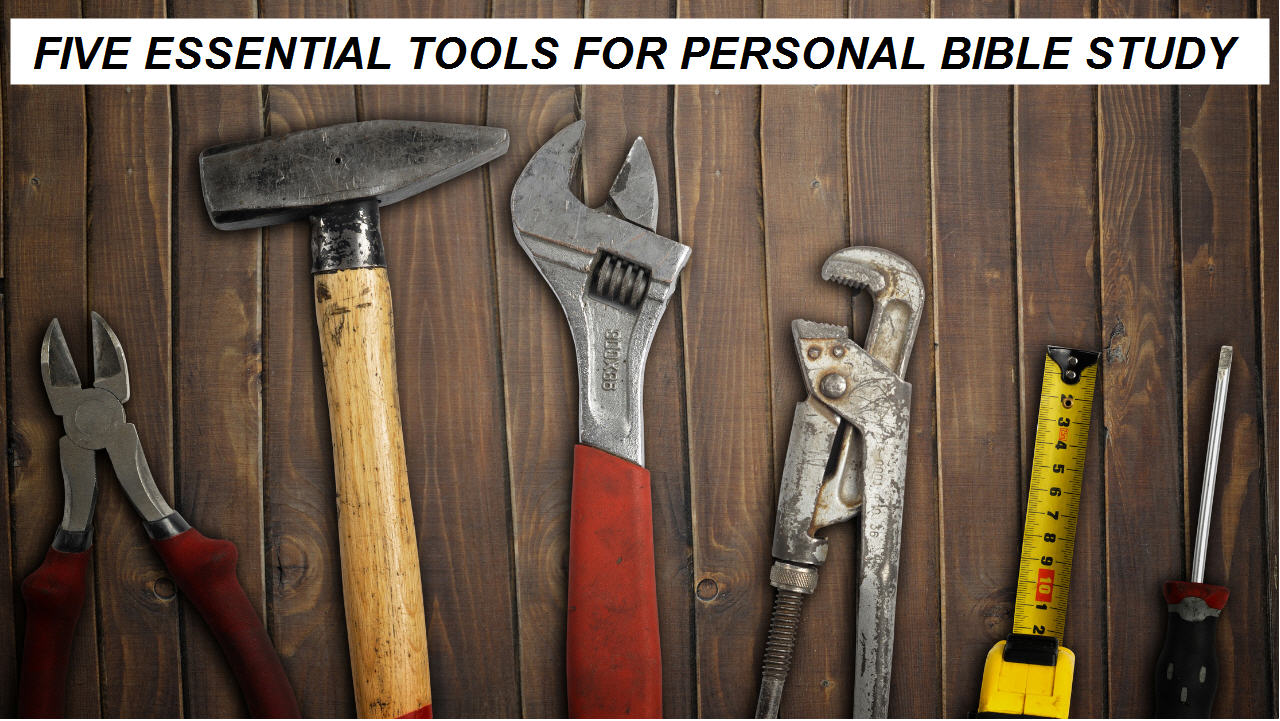5 ESSENTIAL TOOLS FOR PERSONAL BIBLE STUDY

5 Essential Tools for Personal Bible Study
These tools are the must-have resources you’ll need in your quest to build your Bible literacy and understanding of God’s word. You don’t need a full library of resources or the latest and greatest prepared and marketed Bible studies. A few simple bible study tools will get you started and take you a long way.
A BIBLE
While this is pretty obvious, you might consider having not just one Bible, but two. Why you ask? You really need one Bible that you can mark up. Your regular, gold leaf paged, leather Bible isn’t the best choice here for a couple of reasons. First of all, you’re probably hesitant to mess up the pages. And those pages are way to thin to handle ink and highlighting without bleeding through. You also need MORE ROOM for writing than most Bibles provide. So save your treasured leather Bible for taking to church or sitting on your bedside table and get yourself a “journaling” Bible with wide margins, or better yet, print yourself the passage you’re studying in double spaced, wide-margin format from an online Bible.
A BIBLE DICTIONARY
Using a Bible Dictionary (Vine’s is popular), or even a regular English dictionary is crucial to making sure you understand what you are reading. It may seem obvious to you to look up unfamiliar words in the dictionary, but your understanding of a passage can greatly increase by looking up the familiar ones too. Don’t assume that you understand every word you’re reading! Make note of the definitions by jotting them down on your marked-up Bible pages.
A CONCORDANCE
A concordance has a lot to offer as you go deep in your personal Bible study. Use it to look up the original Greek, Aramaic or Hebrew words used. You’ll find that not every time a particular English word is used it was translated from the same original word. A concordance will also help you find other passages in the Bible where the same word is used. If you have a study Bible, your cross-references will help with this too, but a concordance will show you every single instance that same word occurs in the original language.
BIBLE ATLAS
A Bible Atlas is also a very nice addition to your Bible study library. It can bring to life where events took place, where people traveled when sharing the Gospel and helps you understand the interaction of cultures as world travel spread the Gospel. I thought that a Bible Atlas would help me locate the places referenced in the text, understand the distances between locations, and show the political borders involved. I was pleasantly surprised to find that it offered so much more than that! The first thing I noticed when I took a peek at The Basic Bible Atlas is that there is actually more text in the book than maps! Besides colorful maps and many illustrations, it’s an introduction to how places play a role in the story of the Bible.
COMMENTARY
A good Bible commentary is an important tool for your personal study of the Bible, but you should possibly consult it last when studying the Bible. The reason for this comment is if you consult the commentary before you have done your own study of the passage, you will rely upon the commentary rather than seeking to think, contemplate and go through the work of making learning your personal pursuit. Once you have a good personal experience with the Bible passage and wish to see more information about the text, that’s when you consult the commentary. It’s tempting to reach for your study Bible’s notes or commentary when you find something you don’t understand. But there is value in wrestling with an idea or question and allowing yourself to stretch to try to discover the answer yourself. Start with the Bible itself. Read the passage that has you hung up repeatedly. Read the chapter and book in its entirety for context. Check different translations. Use your dictionary to define terms. Look-up cross-references. Pray. Then, after you’ve put in the work, check out the thoughts of trusted experts. There are two types of commentaries: book-specific commentaries and whole Bible volumes. A good plan is to have a good, whole Bible commentary and then collect the book specific volumes as you go.
Now you have your tools, go and use them to dig into the Bible and see how your spiritual life and your relationship with God will GROW!